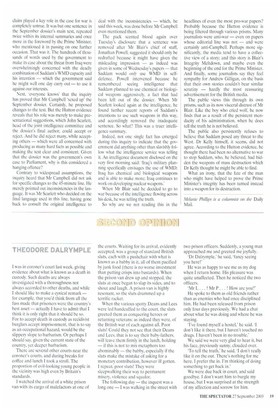THEODORE DALRYMPLE
I was in coroner's court last week, giving evidence about what is known as a death in custody. Such deaths are always investigated with a thoroughness not always accorded to other deaths, and while I should like to make a cynical remark — for example, that you'd think from all the fuss made that prisoners were the country's hest asset — actually I have to admit that I think it is only right that it should be so. For to accept death in custody as recidivist burglars accept imprisonment, that is to say as an occupational hazard, would be the slippery slope to barbarism. Or perhaps I should say, given the current state of the country, yet deeper barbarism.
There are several other courts near the coroner's courts, and during breaks for coffee and lunch I took a stroll. The proportion of evil-looking young people in the vicinity was high even by Britain's standards.
I watched the arrival of a white prison van with its cargo of malefactors at one of the courts. Waiting for its arrival, evidently accepted, was a group of standard British sluts, each with a pushchair with what is known as a babby in it, all of them pacified by junk food (there is no worse investment than putting crisps into bastards). When the prison van drew up and stopped, the sluts at once began to slap its sides, and to shout and laugh. A prison van is highly resonant, so the sluts drummed up a terrific racket.
When the various spotty Deans and Lees were led handcuffed to the court, the sluts greeted them as conquering heroes or returning veterans: as indeed they were, of the British war of each against all. Poor sluts! Could they not see that their Deans and Lees, that is to say their baby-fathers, will leave them firmly in the lurch, holding — if this is not to mix metaphors too abominably — the babby, especially if the sluts make the mistake of asking for a monetary contribution, however ill gotten. I repeat, poor sluts! They were sleepwalking their way to permanent misery, violence and squalor.
The following day — the inquest was a long one — I was walking in the street with two prison officers, Suddenly, a young man approached me and greeted me joyfully.
'Dr Dalrymple,' he said, 'fancy seeing you here!'
He was as happy to see me as my dog when I return home. His pleasure was quite unaffected. Then he noticed the two officers.
'Mr L. . . ! Mr P. . . ! How are you?'
He spoke to them as old friends rather than as enemies who had once disciplined him. He had been released from prison only four days previously. We had a chat about what he was doing and where he was staying.
'I've found myself a hostel,' he said. don't like it there, but I haven't touched no drugs. I haven't been in no trouble.'
We said we were very glad to hear it, but his face, previously sunny, clouded over.
'To tell the truth,' he said, 'I don't really like it on the out. There's nothing for me here. I prefer the in. I'm thinking of doing something to get back in.'
We were due back in court, and said goodbye. I don't want him to burgle my house, but I was surprised at the strength of my affection and sorrow for him.


























































































 Previous page
Previous page